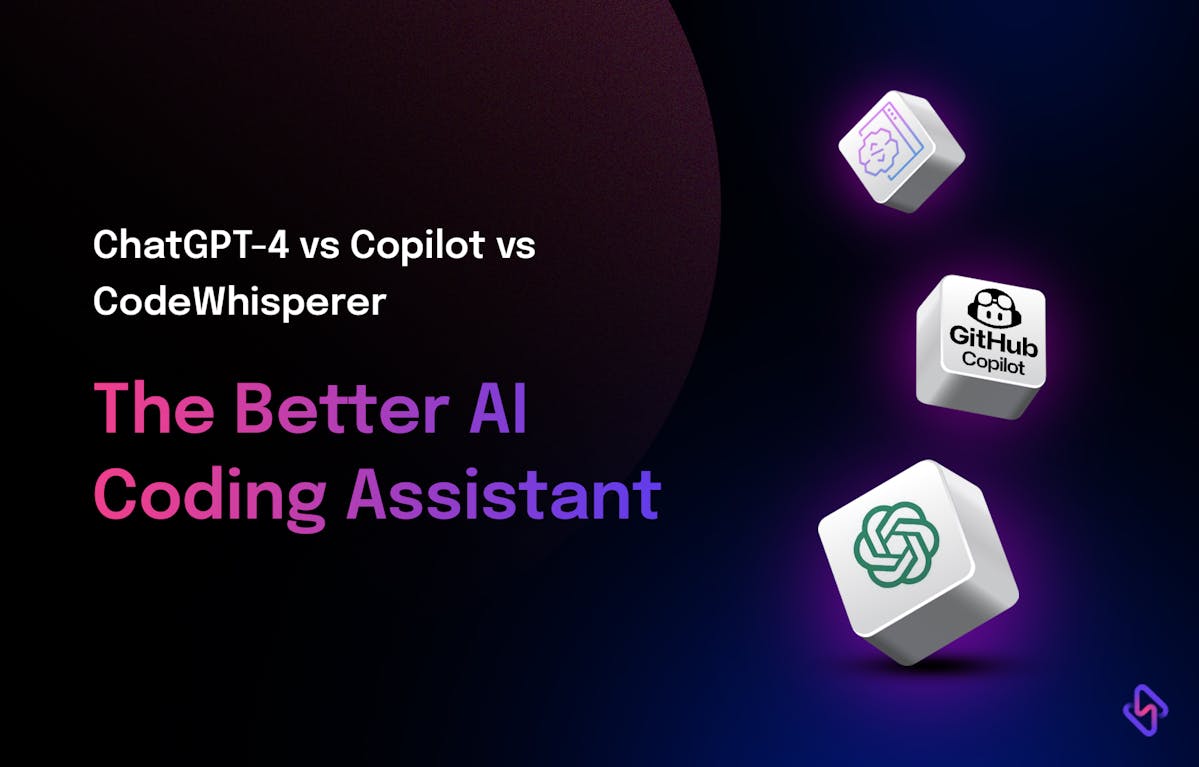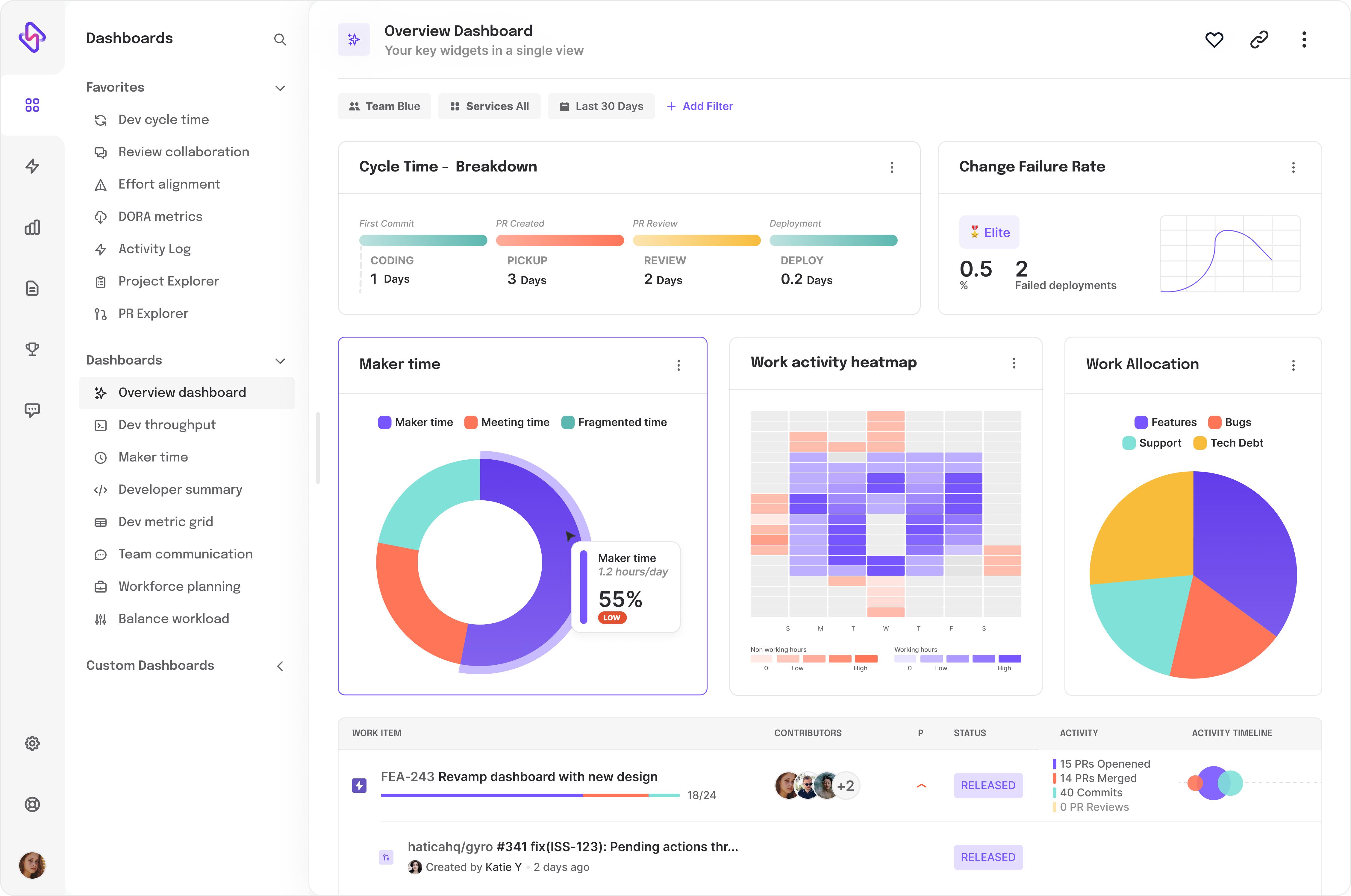The daily releases of technological advancements continuously shape the way developers work and build software. Modern-day programming has recently been intertwined with AI-powered programming assistants. And has emerged as transformative tools, promising to enhance developer productivity and efficiency. As we embrace this new era of AI assistance, three prominent contenders have captured our attention: ChatGPT, Copilot, and CodeWhisperer.
These AI assistants have their roots in the incredible strides made in natural language processing (NLP) and machine learning. They signify a shift towards more intuitive and user-friendly interactions, marking a departure from the traditional reliance on rigid programming syntax.
In this article, let's explore these programming assistants in-depth, uncovering their origin stories and the underlying technologies that empower them. We will delve into their real-life impact on developers by providing illustrative examples of code generation. Together, we'll unravel the potential these AI companions hold, guiding you to optimize your coding workflow and embrace the future of programming assistance. Let's embark on this fascinating journey to discover the AI assistant that best suits your developer's toolkit.
The landscape of AI-powered programming assistants has been shaped by pioneering companies that own and develop these revolutionary tools. Let's delve into the introductions of ChatGPT-4, Copilot, and CodeWhisperer, exploring their parent companies, code generation methods, and overall vision.
ChatGPT-4 (OpenAI): What is It?
ChatGPT-4 is the latest iteration of OpenAI's groundbreaking language model series, known for its natural language processing (NLP) capabilities. OpenAI, founded in 2015, is a research organization with a mission to ensure that artificial general intelligence (AGI) benefits all of humanity. Their journey began with the release of GPT-1, a revolutionary model that demonstrated the potential of transformer-based architectures. With each subsequent version, including GPT-2 and GPT-3, OpenAI refined and improved its models, addressing limitations and expanding its capabilities.
OpenAI, a research organization focused on developing friendly AI for the betterment of humanity, is the brain behind ChatGPT-4. Building on its predecessors, ChatGPT-3 and GPT-3.5, this latest iteration harnesses powerful natural language processing capabilities. OpenAI trained ChatGPT-4 on a massive dataset encompassing various domains, making it a versatile assistant that can interact with developers using plain English. The model continues to learn from interactions, constantly improving its understanding and providing valuable insights for developers.
GitHub's Copilot: Quick Introduction
Developed in collaboration with OpenAI, GitHub’s Copilot is tailored specifically to help developers with coding tasks. It is trained on a vast collection of code repositories and excels in generating contextually relevant code snippets. This specialized programming assistant is powered by OpenAI's GPT-3 technology and trained on an extensive collection of public code repositories available on GitHub. Copilot's unique strength lies in its contextual understanding, allowing it to generate relevant code suggestions based on the specific project being developed. This integration with GitHub positions Copilot as a powerful tool within developers' existing coding environments.
Amazon CodeWhisperer
Amazon CodeWhisperer seamlessly integrates with your integrated development environment (IDE), providing developers with on-the-fly code suggestions. Individual developers can harness the power of CodeWhisperer for free, offering a remarkable toolset to boost their coding efficiency. On the organizational front, a flat "per user, per month" subscription fee empowers entire teams to unlock CodeWhisperer's potential. The absence of upfront fees and long-term commitments ensures cost-effectiveness and flexibility.
ChatGPT-4 vs Copilot vs CodeWhisperer: What To Choose?
1. Adoption and Pricing
- ChatGPT-4's natural language interface has made it widely adopted by developers across various domains, and it offers different subscription plans with varying levels of access.
- Copilot, integrated into GitHub's coding environment, has been widely used by developers within the GitHub community. GitHub offers Copilot as a subscription service, which may be bundled with other GitHub features.
- Regardless of tier, both Individual and Professional tiers allow unlimited inference requests per month, liberating developers to seek AI assistance at scale. However, to mitigate fraud and abuse, certain limits apply, ensuring a seamless experience for legitimate users. For organizations with higher requirements, custom limits are available upon contacting Amazon.
2. Code Suggestions and Review
- Copilot's specialization in code generation based on contextual understanding places it ahead when it comes to providing relevant and accurate code suggestions.
- CodeWhisperer shines across various programming languages, like Python, Java, JavaScript, TypeScript, C#, Rust, Go, Ruby, Scala, Kotlin, PHP, C, C++, and Shell Scripting. Additionally, code security scans are supported in VS Code and JetBrains IDEs for Python, Java, and JavaScript, fortifying code quality and security.
- While ChatGPT-4 can generate code, it might not be as proficient as Copilot and CodeWhisperer in providing contextually relevant and accurate code suggestions.
3. Use-cases
ChatGPT-4:
- Assisting in brainstorming and idea generation for projects beyond coding.
- Drafting documentation and explanations for complex algorithms.
- Collaborative coding and team discussions in natural language.
Copilot:
- Auto-completion of repetitive code segments to enhance coding efficiency.
- Generating contextually relevant code snippets based on project context.
- Adhering to coding standards and best practices within the GitHub environment.
CodeWhisperer:
- Personalized code suggestions and support tailored to individual developers' coding styles.
- Assisting with code reviews and identifying potential bugs and errors.
- Offering context-aware code suggestions for specific projects and domains, extending its support to several AWS services and environments, including AWS Cloud9, AWS Lambda console, and Amazon SageMaker.
4. Comparing Efficiency and Productivity
Each AI assistant has its strengths in enhancing coding efficiency and productivity:
- ChatGPT-4 offers versatile language interactions and can assist with various non-coding tasks, promoting creativity and collaboration. Developers can leverage ChatGPT-4 for brainstorming sessions, documentation drafting, and overall collaboration.
- Copilot excels in generating contextually relevant code, reducing repetitive coding efforts, and promoting adherence to coding best practices. It can be integrated into IDEs to streamline coding tasks, reduce boilerplate code, and encourage adherence to coding standards.
- CodeWhisperer strikes a balance by combining natural language understanding with contextual coding assistance, facilitating code reviews and personalized coding support.
5. Accuracy and Reliability
While AI-powered programming assistants have shown tremendous potential, they are not without limitations:
- ChatGPT-4's lack of contextual understanding may lead to incorrect code suggestions in complex scenarios.
- Copilot's reliance on existing code patterns may limit creativity and diversity in coding solutions.
- CodeWhisperer's performance may vary as it learns and improves from user feedback over time.
6. Word of Caution
Developers must be mindful of potential concerns when using AI-powered assistants:
- Overreliance on AI tools may hinder developers' ability to fully comprehend and troubleshoot code.
- AI-generated code may not always align with specific project requirements and can inadvertently introduce security vulnerabilities.
[ Read Related: Use CodeWhisperer to Build a Browser Extension ]
Bottom Line: The Right AI-Powered Coding Companion For Your Needs
In conclusion, ChatGPT-4, Copilot, and CodeWhisperer each have their unique strengths and weaknesses. The best choice depends on the specific needs and preferences of individual developers.
ChatGPT-4 excels in versatility and creative collaboration, making it a valuable addition to any development toolkit. Copilot shines in generating contextually relevant code and maintaining coding standards, ideal for projects with repetitive tasks and specific coding patterns. CodeWhisperer's context-aware coding and personalized support make it a promising choice for developers seeking tailored assistance.
Each tool's strengths and the background of the companies behind them offer unique perspectives on the future of AI in programming. As developers embrace these AI-powered assistants, it becomes evident that the journey of code assistance has only just begun, promising even more powerful and efficient development experiences in the years to come.
As AI continues to reshape the developer's toolkit, ChatGPT-4, Copilot, and CodeWhisperer stand out as powerful programming assistants, each with its unique strengths and offerings.
Whether it's ChatGPT-4's versatility, Copilot's contextual code generation, or CodeWhisperer's personalized support, these AI-powered assistants hold the promise of enhancing coding efficiency and productivity, propelling developers into a future of smarter and more efficient software development.
Ultimately, I encourage developers to experiment with these AI assistants and incorporate them thoughtfully into their workflows to maximize their benefits while balancing human expertise with AI assistance.
Also, if you do not want to miss out on more engineering insights, subscribe to our blog.



